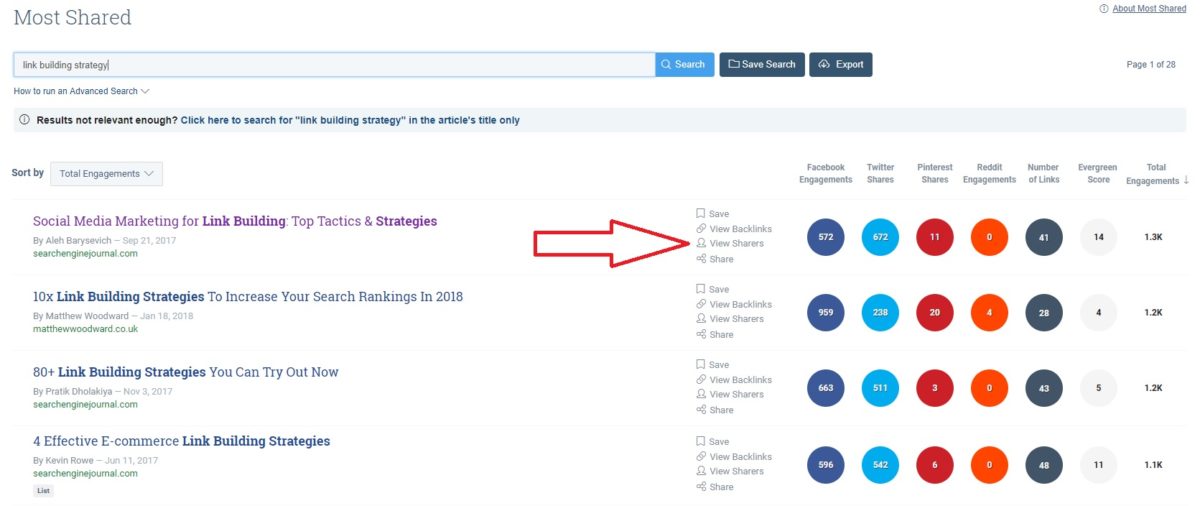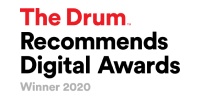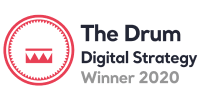What is Link Building?
Link building refers to the processes through which we encourage other brands to display a link to our website on their own. We want other websites to link back to our website. Every link we receive can be thought of as a vote for our website’s credibility and value. In simple terms, it’s the website with the most high-quality votes that stands the greatest chance of ranking highly for its key terms.
Gaining backlinks, and a healthy link profile accounts for the vast majority of a site’s ranking according to Google’s algorithm. If you want to hit number one for your keywords and stay there, you need a diverse and healthy link profile.
Today’s link building is centred firmly on links from reputable sources which are relevant to our sector or location, and are given free of charge because somebody values us as experts in our field.
Social media is often thought of as pointless for links, as links from social media platforms are unfollowed. But this isn’t the purpose of using social media for link building: the main purpose of link building through social media is to get links outside the social networks through the people inside them.
The Value of Social Media in Link Building Strategies
Think of any networking event you’ve been to: we’ve all met that one person with the business cards, right? You know, that person who boldly walks up to you, hands you their business card and starts speaking at you about how fantastic they are and why their business is so brilliant. And it’s annoying. It’s annoying because you don’t know that person and they haven’t taken the time to get to know you either.
It’s exactly the same case online. You can’t expect to receive a link from somebody by asking for it straight away. As I said above, link building is about relationships, and it’s by forming and cultivating these relationships, that we can build up links back to our site.
Social media including Facebook, LinkedIn, Twitter, Pinterest, YouTube, blogging and so on, is the tool through which we get those relationships. It’s where we show our business’ personality. It’s a way of introducing ourselves and getting involved in conversations by adding real value. It’s important to consider this relationship in all of your social media activity, be it business to business or business to consumer. Think about the conversation – listen as much or more than you speak, share things that are useful, and respond to people.
While social media has no direct impact on search rankings, it can help with traffic in other ways. We can use social media to improve link building; specifically, it can help in the following areas:
- Outreach
- Link prospecting
- Content ideation
- Content promotion
If you want to be effective in building links, then you need to use all the tools at your disposal.
How to Use Social Media for SEO Link Building
By this point, you know what link building is and you know that social media is the tool we use to support the relationships needed for link building. But that’s all a bit conceptual. So, here are my top tips for link building with social media. Let’s look at Twitter, as I believe it is arguably the most powerful channel for your link building efforts.
1. Set up a Twitter Account and Listen
The first and perhaps most important thing you can do for your link building efforts is to listen to what people are talking about. If you don’t have one already, sign up for a Twitter account and start watching what people are saying. Follow your competitors and your customers, look for people who are influential in your industry, and keep up to date with what’s happening in your local area. What are they talking about?
2. Build Relationships
Social media is about building relationships, it’s no different when trying to build links. In the end, we want to influence editors/webmasters to click publish on our link. This won’t happen unless you start off right, and look to build a relationship. In the long term, these relationships can help build links. Building social media relationships isn’t as easy as it sounds – it has to be natural, seem personal, and engage in an honest manner. It’s this way that you can look to earn links, as they will only come from contacts that trust you.
Please don’t try to automate your interactions; whilst it may save you time, it won’t bring you results. Social media helps foster relationships, which in turn helps to build links and improve rankings.
3. Identify the Specific People You Want to Connect and Outreach With
Across all social media, you’ll find influencers – people or brands who have a strong following and who are well respected in what they do. Identify those people for your business, and think about who you want to start engaging with, and could give you a valuable link back to your website. Remember what I said above about what constitutes a “good link”.
You will need to use a social media tool – platforms like Followerwonk, and Buzzsumo are great for this.
In Buzzsumo, you search a keyword and it presents you with the most shared content. Here you view sharers.
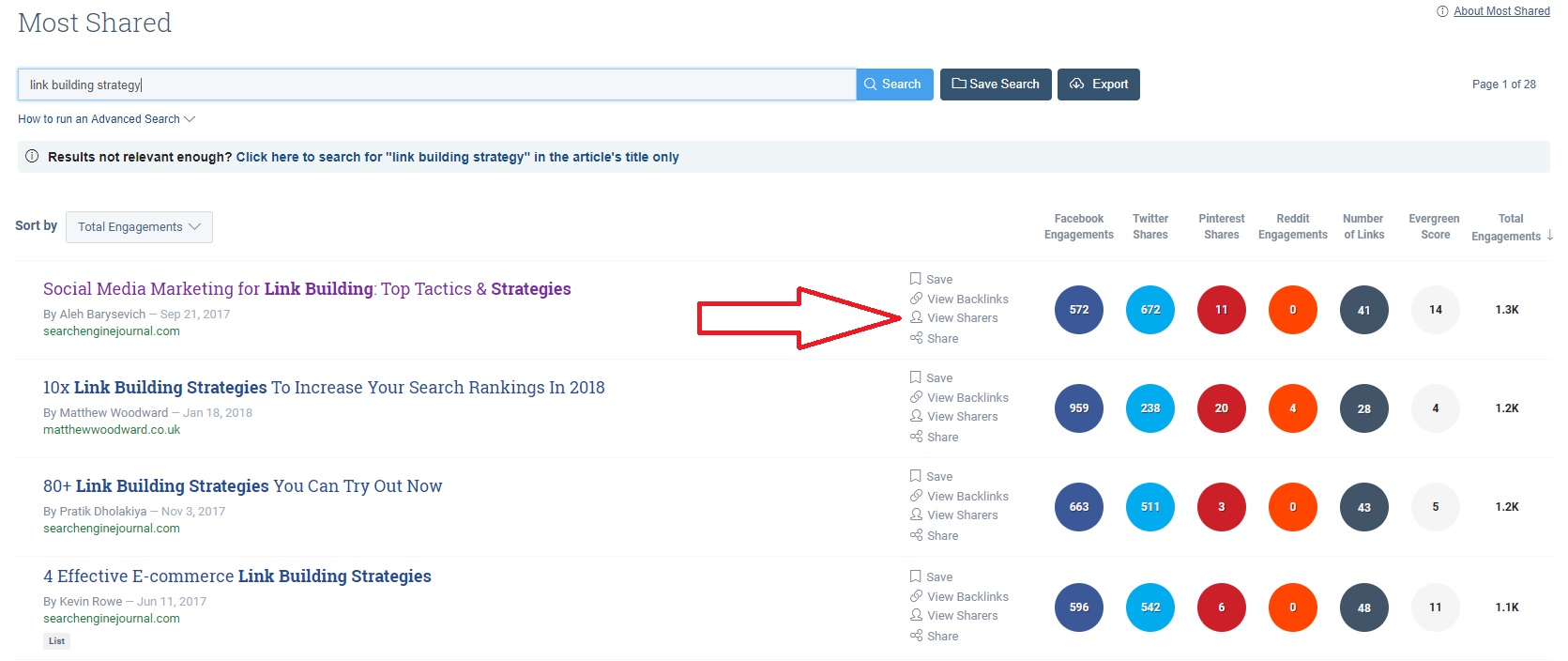
And you can then export the sharers, and create lists to target.
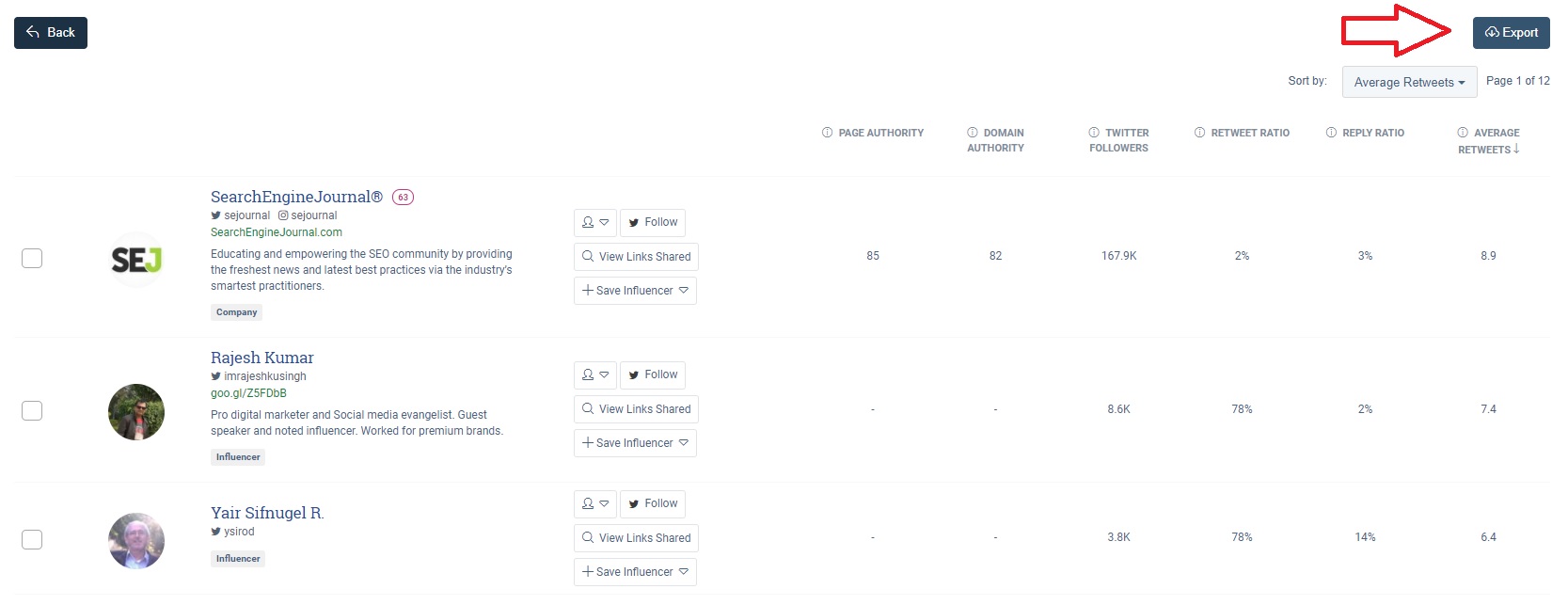
Enter your industry or a keyword into your tool of choice and you can find authors that have mentioned these keywords. You can then sort them based on your criteria, such as the number of times they’ve mentioned the keywords, or by the size of their audience (or both). This gives you a list of key influential voices you want to reach out to in your sector.
Once you’ve found them, it’s all about interaction. Jump back to point two and luckily, social media is exactly the place to do that. Connect with bloggers you’ve chosen and spend some time engaging with their content. Then, when you finally approach them with a request to get mentioned, you’ll have a much better chance of receiving a positive reply.
This can also help with the ideation of content stage, as you can gain a really nice idea of what types of content have been popular among your industry’s influencers in the past – a great starting point for content ideation.
4. Post Content That Gets Their Attention and Adds Value
It’s important to make your content work as hard as possible by amplifying it across a number of different channels. That way, you can reach a more diverse audience over a greater period of time.
You shouldn’t post all your content. It’s unnecessary unless you’re posting the very best content you have. A well-known content marketing principle is to let your audience’s interest be your guide in creating the content. It’s the same when choosing what to post. If there is no interest, then don’t post the content. Simple.
It’s the same when interacting, if you can’t say something worthwhile, think of something worthwhile to say. It might be that someone you’ve identified as an influencer has posed a question on a LinkedIn group; well if you know the answer, respond! Consider how you frame that response: it might be that you write a reply and then link back to a page on your website where you’ve explored the question in more detail. Perhaps it may be a blog article, or an infographic or some kind of visual you’ve created that aids the answer to the question. It may even answer the entire question itself.
Social has become a key distribution channel for content, and once your content is out there and starts generating engagement via social shares, it gets traffic. And traffic is a metric that Google definitely cares about. Social sharing provides a form of social proof, giving greater credibility and trustworthiness to your content.
Your audience, the amount of likes and shares all builds social proof, which, in turn, gives credibility to your content and can make it appear more trustworthy. This gives you a higher chance of gaining good quality links.
5. Outreach
Why not outreach directly through Twitter? As well as emailing, and phoning up, tweet influencers your content, or comment on their tweets. You have to be in it to win it, it can’t hurt, it can only help. I once did a data driven case study, and then outreached it to influencers through Twitter.
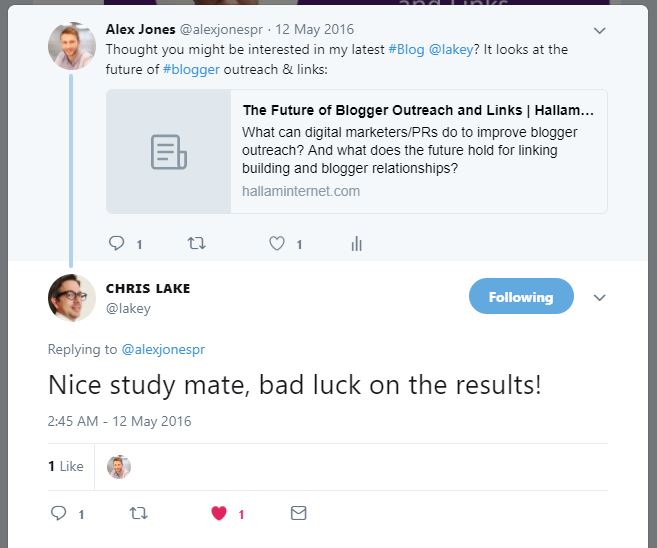
Which resulted in this coverage and a link to Hallam.
So what happens if you follow these steps? People start linking to you!
And that’s the value of social media for link building. It’s a conversation, a slowly developing relationship which, when managed well, can pay dividends in terms of SEO link building.
If you’re looking for help with your SEO or social media marketing, feel free to get in touch. We’d love to work with you.
